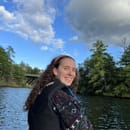Have you ever seen people talking and then they learn that they share another language? And have you noticed the way their tone and faces light up when they begin speaking that language? It’s almost as though they’ve gained a new family member.
That’s what language does. Languages are such an important part of our lives and identities. They are a form of connection not only to who we are but to those around us.
My mom is what they call a polyglot. She can speak multiple languages, fluently – four languages to be exact. She has English as her first language, learnt French all throughout school and postsecondary, and grew up speaking Greek and Spanish with her parents.
Me on the other hand? I can speak English.
Throughout elementary school, I studied French and was even in French immersion in grades 4, 5 and 6. I certainly wasn’t 100 percent fluent, but I could carry a good conversation. In middle school, however, the school I went to didn’t offer French immersion; all they had was the regular, mandatory core French class.
Despite it being French class, there wasn’t a whole lot of French being spoken. Because of this, and my not practising myself, I lost basically all of the French I had. I tried to get it back in high school, but again, the classes weren’t that engaging and COVID-19 messed up our schedules, so I couldn’t even take it in grades 11 or 12.
So now, I’m without French.
Growing up, my mom never spoke to me or my brothers in Greek or Spanish, nor did she put us in classes. I know it’s something that she wishes she had done because now, that form of connection to my family’s Greek and Puerto Rican culture has probably ended.
We still have family in both of these places and practise many of their traditions, but I’m not able to communicate with those family members in their actual languages. They always have to switch to English in order for us to have a conversation.
As I’ve gotten older, I’ve come to realise how important and beautiful it is to be able to speak multiple languages, especially when you have a connection to them. Growing up, when my mom wouldn’t speak to us in these different languages, I never even gave it a single thought. But now, I too wish she had taught us them.
Not only would it be so cool to say that I speak Greek and Spanish, but when I tell people I’m part Greek and Puerto Rican, I would actually have something to show for it. I would be able to have a stronger connection and sense of identity to those cultures.
While I don’t have any personal connection to French, it’s a very important language to know, especially living in the capital of Canada, and planning on going into a journalism career.
Looking into my personal future, when I get married, if my husband comes from a different culture and speaks a different language, I would want our kids to grow up speaking it, too.
Not only that, I want to understand and speak it. I want to have that connection to my husband and his family, as well as my kids. I want them to have that connection to their culture that you get through language, right from the start. That is instead of being in my situation where I am trying to gain it myself, now.
Languages are hard. They’re hard to learn, especially when you start learning them at an older age. You grow up being conditioned to the way that your language works. So, when learning a new one, that has different rules, it’s hard to understand. And then, when it’s a language that has a completely different alphabet, that’s a whole other level of difficulty.
However, even though I know it will be hard, I’m hopeful that I will be able to learn the languages of my family. I would love to have that connection to my culture.
I think it’s beautiful that people can communicate in their own special ways and I want to share that beautiful gift, too.



